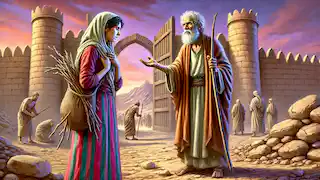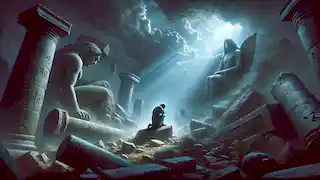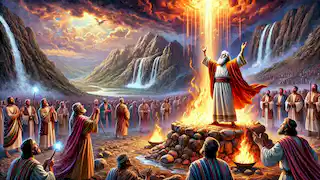The Fifth Mountain By Paulo Coelho
Reading time: 9 min

About this story: The Fifth Mountain By Paulo Coelho is a Historical Fiction from Israel set in the Ancient This Dramatic tale explores themes of Perseverance and is suitable for Adults. It offers Inspirational insights. A prophet’s journey through faith, doubt, and divine purpose.
Introduction
_The Fifth Mountain_, written by Paulo Coelho, is a profound novel that delves into the intersection of fate, faith, and resilience. The story follows the biblical prophet Elijah as he is tested by life’s hardships, battles with his inner doubts, and embarks on a journey of personal transformation. In this tale, Coelho explores how individuals can transcend suffering and align themselves with their divine purpose through a blend of spirituality, historical fiction, and deep philosophical musings. The novel is an inspiring allegory that resonates with readers who seek to find meaning amid adversity.
The Call of the Lord
Elijah lived in the Kingdom of Israel, a land where the people had forsaken the ways of their ancestors and embraced the pagan worship of Baal. The prophet, hearing the voice of the Lord, delivered a dire prophecy to King Ahab, foretelling a devastating drought that would plague the land unless the people repented and returned to their faith. But rather than being heeded, Elijah’s prophecy led to his persecution. Jezebel, the queen who fervently worshipped Baal, demanded his execution.
Fleeing for his life, Elijah sought refuge in the wilderness. The Lord commanded him to journey to Zarephath, a city within the land of Sidon, and there he would be sustained. Although fearful, Elijah obeyed, for his faith in the Lord was absolute. Yet the journey to Zarephath would not be without its trials, as Elijah’s faith would be tested by hunger, thirst, and the deepening despair that often accompanies solitude.
The prophet arrived in Zarephath, where he encountered a widow gathering sticks at the city’s gate. The Lord had told Elijah that this woman would provide for him. “Bring me a little water in a cup, that I may drink,” he asked her. The widow turned toward him, her face gaunt and lined with hardship, and he added, “And bring me a morsel of bread.”
But the widow’s eyes filled with tears as she confessed, “As the Lord your God lives, I do not have bread, only a handful of flour in a bin and a little oil in a jar; and see, I am gathering a couple of sticks that I may go in and prepare it for myself and my son, that we may eat it, and die.”
Elijah’s heart broke for the woman, but his faith in the Lord’s promise was strong. He assured her that if she prepared the bread for him first, the flour and oil would not be exhausted until the drought ended. And so, the woman, in her desperation, trusted the prophet’s words, and a miracle occurred: the flour and oil never ran out. Elijah stayed with the widow and her son, and the small household was sustained throughout the long drought.

The Mountain of Despair
The days grew harder as the drought persisted, and Elijah, though grateful for the sustenance, was tormented by visions of Israel’s suffering. He prayed to the Lord every day, hoping that the people would return to faith and the rain would fall once more. But no sign came from above. The sky remained clear, and the land continued to wither.
One day, the widow’s son fell grievously ill, and despite all efforts, the boy succumbed to death. The widow, stricken with grief, turned to Elijah in rage, accusing him of bringing misfortune upon her house. “What have I to do with you, O man of God?” she cried. “Have you come to me to bring my sin to remembrance and to kill my son?”
Elijah’s faith wavered for the first time since his journey began. He had brought life through the endless flour and oil, yet now death had claimed the widow’s only child. He took the boy into his arms, carried him to the upper room, and laid him upon the bed. He cried out to the Lord in despair, questioning the purpose of this loss. But even in his anguish, Elijah’s prayers remained sincere.
“Lord my God, let this child’s soul come back to him,” Elijah pleaded three times. And after a prolonged period of silence, the Lord heard the prophet’s prayer. The child’s soul returned, and he lived. Elijah brought the boy back to his mother, who fell to her knees in gratitude and declared, “Now by this I know that you are a man of God, and that the word of the Lord in your mouth is the truth.”
This miracle, however, did not fill Elijah’s heart with peace. He could feel the weight of the coming storm, the tension mounting within him as if an unseen force was drawing him toward something greater, something more perilous.
The Fifth Mountain Beckons
The Lord commanded Elijah to return to Israel and confront King Ahab once more. His heart heavy, Elijah obeyed, knowing that this journey would take him to the Fifth Mountain, a place he had only heard of in distant tales. The mountain loomed ominously on the horizon, its peak shrouded in clouds. It was said to be a place of immense power, where the gods of men and the true God waged eternal war.
As he approached the mountain, Elijah encountered a young boy, who guided him through the treacherous paths leading to the summit. “Why do you seek the Fifth Mountain?” the boy asked, his voice trembling with awe.
“I do not seek it,” Elijah replied. “I am led by the Lord. It is His will, not mine.”
The boy nodded but remained silent. Elijah felt the weight of his mission grow with every step. The mountain symbolized more than a physical ascent; it was a metaphor for the prophet’s struggle between faith and doubt, between divine will and human desire. The higher he climbed, the more he felt the pull of his own questions, his own fears.
At the peak, Elijah found a desolate place, a ruin of ancient stones and fallen idols. There, he heard a voice—not the voice of the Lord, but something darker, something that whispered of despair and hopelessness. “Turn away from your path, Elijah,” the voice said. “There is no glory, no salvation in your struggle. The people will not return to the Lord.”
Elijah fell to his knees, overwhelmed by the weight of doubt. The silence of the heavens echoed around him, and for the first time, he questioned the purpose of his suffering, his trials, and his unwavering obedience.
But then, in the stillness, came a gentle whisper—a whisper that cut through the darkness of his soul. “Elijah,” it said. “Rise.”
And so, Elijah rose. He understood now that the Fifth Mountain was not a place of conquest but a place of surrender. He had to surrender his doubts, his fears, his desire for control. He had to trust in the Lord’s plan, even when it was incomprehensible to him.

The Return to Israel
Elijah descended the mountain with a renewed sense of purpose. He returned to Israel, where the drought had worsened, and the people were on the brink of collapse. King Ahab, weakened by his losses, sought Elijah’s counsel. “What must we do?” Ahab asked. “The land is dying, and so are we.”
Elijah, filled with the strength of his faith, told Ahab to gather all the prophets of Baal at Mount Carmel. There, they would have a contest to determine whose God was true. The people of Israel gathered to witness the event, torn between the old gods and the promise of salvation through the Lord.
Atop Mount Carmel, the prophets of Baal called upon their god to bring fire from the heavens to consume their offering, but nothing happened. They cried out, danced, and even cut themselves, but Baal remained silent. Then it was Elijah’s turn. He repaired the altar of the Lord, laid the offering upon it, and poured water over it until the trench around the altar was filled.
Elijah prayed to the Lord, and immediately, fire descended from the heavens, consuming the offering, the wood, the stones, and the water. The people fell to their knees in awe, and Elijah proclaimed, “The Lord, He is God!”
In that moment, the heavens opened, and rain began to fall upon the land, ending the long drought. Elijah had fulfilled his purpose, but his journey was far from over.

The Final Test
Despite his victory at Mount Carmel, Elijah’s trials were not yet complete. Jezebel, enraged by the defeat of Baal’s prophets, vowed to kill Elijah. Once again, he fled into the wilderness, his heart heavy with despair. He had seen the power of the Lord, but now he felt abandoned, hunted, and alone.
Elijah wandered into the desert and sat under a solitary broom tree, where he prayed for death. “It is enough, Lord,” he said. “Take my life, for I am no better than my ancestors.”
But instead of death, the Lord sent an angel to nourish Elijah. The angel brought him bread and water, urging him to continue his journey. Strengthened by this divine provision, Elijah walked for forty days and nights until he reached Mount Horeb, the mountain of God.
There, in a cave, Elijah waited for the Lord. A powerful wind tore through the mountains, shattering rocks, but the Lord was not in the wind. An earthquake followed, then a fire, but the Lord was in neither. Finally, a still small voice called to Elijah.
The Lord spoke to Elijah, not in power, but in quiet, reaffirming his purpose. He was to anoint new kings over Israel and Syria and to appoint Elisha as his
successor. Elijah’s journey, though fraught with hardship, had prepared him for his final role—to pass the mantle of prophecy to the next generation.
Elijah left Mount Horeb with peace in his heart, knowing that the Lord’s will had been done. He had climbed the Fifth Mountain and emerged with a deeper understanding of faith, surrender, and divine purpose.
{{{_04}}}
Conclusion
_The Fifth Mountain_ is a tale of struggle, doubt, and ultimately, redemption. Through Elijah’s journey, Paulo Coelho reminds us that faith is not a shield against hardship, but a path through it. We are all called to our own Fifth Mountain, where we must confront our fears, doubts, and desires. Only through surrendering to a higher purpose can we find true peace and fulfillment.


















